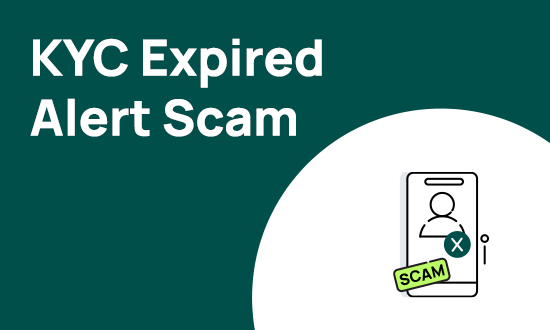What Is KYC Expiry Alert Scam?


Banks conduct KYC (Know Your Customer) verification to confirm a customer's identity. This process helps prevent fraud and ensures compliance with regulations. However, scammers have even found a way to misuse this process and scam people by sending fake KYC alerts.
The fraudulent messages seem so convincing that you cannot help but opt for immediate KYC updates to prevent your account from facing suspension. Not everybody is aware of such scams, and you might be one of them. This is why our fraud awareness campaign #ScamKaSiren is here to help you stay informed and protected. Read on for all important information on KYC expiry alert scam.
KYC fraud occurs when scammers exploit the know-your-customer process to steal personal and financial data. They often play fake bank representatives, send deceptive messages and create fake websites to bluff people into sharing sensitive information.
The rising number of financial services operating online has directly resulted in higher KYC fraud occurrences as it is easier for people to believe them.
Here are the most prevalent ways through which KYC frauds happen:
Scammers pretend to be bank officials and contact people to get their Aadhaar, PAN or OTP numbers by falsely claiming KYC maintenance. They often create a sense of urgency, forcing victims to reveal their personal information.
Fraudsters use stolen or fake identity documents to create accounts in someone else's name, often leading to the misuse of financial services.
Scammers send emails pretending to be from banks, asking users to upload their KYC documents on a fake website.
Fake banking websites are designed to collect sensitive information when users unknowingly enter their details for KYC verification.
Knowledge about KYC fraud, along with cautionary practices, helps prevent this type of security violation. Here are some key precautions to take:
| Do’s | Don’ts |
|---|---|
| Always verify the identity of the sender before sharing any KYC details. | Do not share OTPs, PINs, or passwords with anyone. |
| Use official bank websites and apps for KYC updates. | Do not click on links from unsolicited messages or emails. |
| Report suspicious activity to your bank or cybercrime authorities. | Do not upload sensitive documents on unfamiliar websites. |
KYC scams have unfortunately become very common and a lot of innocent people are getting trapped by scammers. Always be cautious with unexpected KYC update requests, and never share personal details without verification.
If you suspect fraudulent activity, report it immediately. Staying informed helps you combat the risk of being robbed at the hands of a scammer. Remember, caution is the parent of safety!
Always verify information through your bank's official customer service number or by checking their official website. You must never click on links that arrive in your inbox.
You must immediately reach out to your bank to protect your account. Additionally, you must file a report of the incident to cybercrime on cybercrime.gov.in.
Yes, banks may deactivate your account if you don't update your KYC. However, banks will never use random links or calls to inform you about KYC, but they will officially follow a process on their official app or when you visit the branch.